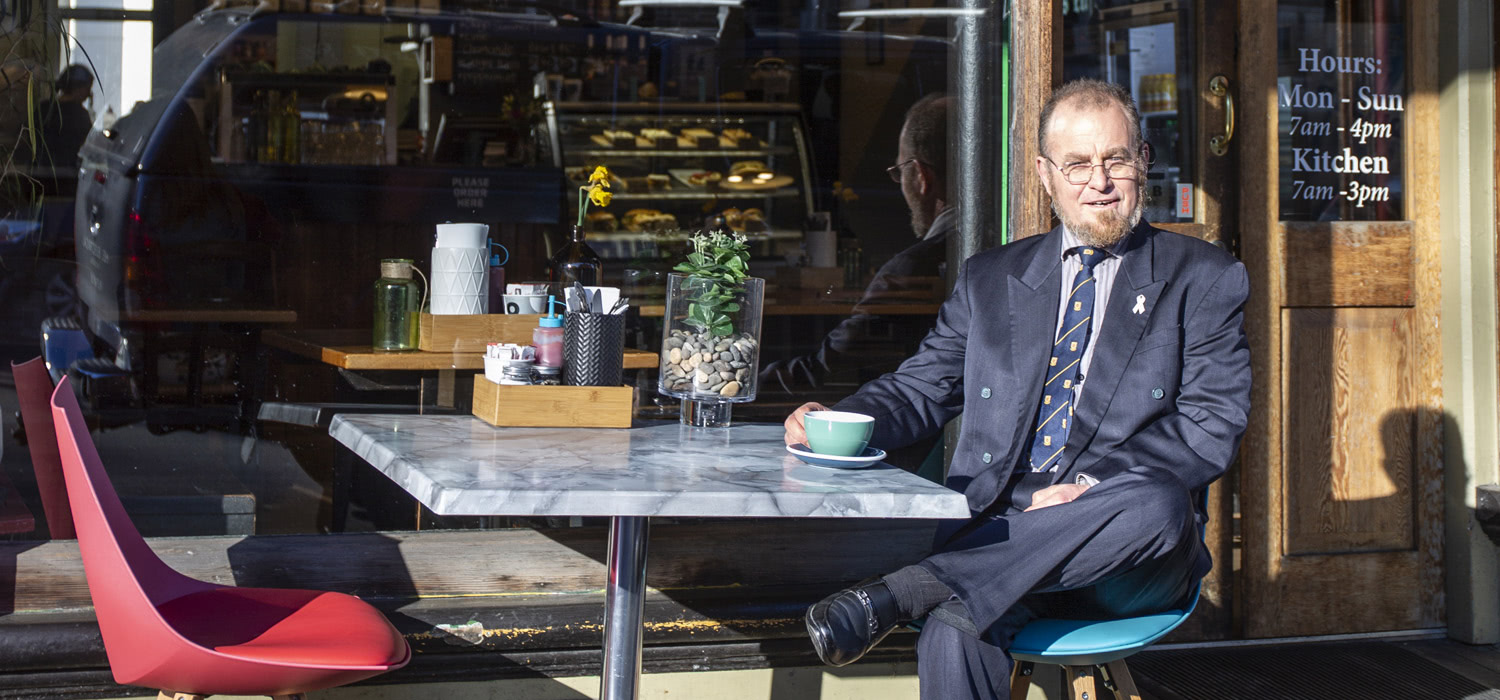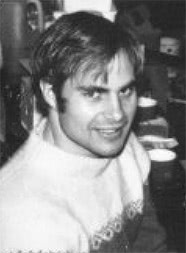
Whatever happened to…
The Governor's Coffee House?
Established in the heady days of the 1970s by friends Andrew Deans and Paul Gourlie, The Governor's Coffee House was less about good coffee and much more about creating a relaxed, alternative place for students for gather.

Andrew Deans circa 1979.
You might not expect a café to prosper when its menu promises awful food, worse coffee and non-existent service.
But the time was the seventies, the location was Dunedin's George Street and the café was The Governor's Coffee House. For Otago students, it was the place to go.
Four decades later, The Governor's is still there. Over the years, coffee culture and students have both matured, so while standards at the current café are bang up to date, it's no longer a nucleus for the kind of social change that swept through the seventies.
It's been suggested that if you claim to remember the sixties you weren't there, and the following decade wasn't much better — but the birth of The Governor's was an unforgettable experience for co-founder Andrew Deans.
The Canterbury University zoology graduate had recently completed a marketing study of a coffee shop as part of a business studies course he'd enrolled in, largely to meet girls.
He'd learned that location was one of the most important factors for success, which sprang to mind when he visited Dunedin in 1977 to take part in University Challenge. After the pubs shut, he and his fellow contestants couldn't find anywhere to socialise.
Dunedin, with its rich concentration of students, was ripe for such a business, so Deans returned with his friend Paul Gourlie to look for a place to set up, ideally close to the University, the Captain Cook, the Robbie Burns and the Edinburgh Tavern.
After turning the corner from the Cook into George Street they found a dingy café with a “for sale” sign in the window. With little or no money, they couldn't afford to buy it as a going concern, but it didn't look as if it had much going left in it.
“We sat down at one of the decrepit tables and looked around,” Deans remembers.
“The place was really run down. The décor was tacky and what we could see of the kitchen was dirty. A less appealing food establishment would be hard to envisage. It was absolutely our kind of place. Our search had ended. It had taken less than five minutes.”
Negotiations revealed that the owner wanted it off his back as the Health Department was on his case. Deans managed to borrow the asking price. Gourlie's parents helped make the place presentable, and the team had a couple of thin months to learn the ropes and gear up for the new student intake.
A business case might discuss forecasting a trend and seizing an opportunity, but Deans admits they really just stumbled into entrepreneurship more by accident than intent.
“Governor” Gourlie had achieved notoriety striding around his Christchurch campus in cap and gown, so the new business adopted his nickname and became The Governor's Coffee House. Gourlie had charisma and the gift of the gab, so was front of house, while Deans focused on keeping everything running.
“Paul and I didn't know much about coffee and knew even less about business, but we knew instinctively that we had to have a point of difference if we were to be successful in our enterprise. So we more-or-less deliberately set up the business as a sort of relaxed, alternative, student-friendly sort of joint.”
After a very slow start, the business took off when the students returned. They didn't know it, but it was just what they had been missing and they turned up in droves. The café's hours grew long, starting early to get the day's baking done and staying open for late customers.
Gourlie says one of the main aims was to give everyone a place to go where they could sit down and meet new people and debate the issues of the day. He credits people he met there — such as David Lange, Chris Trotter and Michael Laws — for getting him involved in politics, which eventually led him away from the business.
Despite not being a student, and standing for fun and frivolity over serious issues, Gourlie's flamboyant, irreverent speeches led to him being elected President of the University of Otago Students' Association in 1979 and 1980.
Deans bought him out and looked for ways to keep people coming into the café throughout the year.
“We used to attract our fair share of eccentric characters and personalities. Many people fitting that description used to work for us.”
One of their day-managers was also a cabaret artist who performed a risqué dance with her daughter, both twirling flaming pois. The act went down well with the crowd until one of the pois lodged in the low ceiling and threatened to burn the place down.
Graeme Downes, founder of the Verlaines and now a respected Otago academic, did a few shifts serving coffee and washing dishes.
Local musicians attracted custom. Country/folk singing twin sisters called Homemade Jam played for coffee and toasted sandwiches before changing their name to the Topp Twins and going on to greater things.
By 1981 The Governor's had become a natural base for the counter-culture that found its voice in the Springbok rugby tour. When the tour reached Dunedin, tensions were running high. Deans was told that the Special Intelligence Service was keeping a close watch on clientele, including his hippy-looking manager.
The night before the game the café was invaded by Southland “rednecks” keen to confront the protesting radicals, says Deans. He called the police, who were notable by their absence, and ended up trying to reason with a riotous crowd.
“To be fair they were simply ordinary rugby-playing Kiwis whose horizons didn't normally stretch much further than Mataura or Gore. After a bit of a tense stand-off they left, having broken only a certain amount of crockery, instead of the heads that had been their original intention — for which I was quite grateful.”
The long hours took their toll on Deans, who managed to sell the café to a co-operative of valued employees to help finance his Otago MBA and he went on to a career in management in Australia.
The co-operative struggled with trying to maintain equal workloads. Despite great weekend crowds, members soon started to drop out. Finally Barbara Gilmour stepped up and kept the business going.
Since then it has changed hands and eras, lost its alt-culture status and earned a freedom to be a regular café, even if one with a pretty wild past.
“I've never regretted that Paul and I started the business,” says Deans. “We never made much out of it, but it gave both of us a great deal. I'm very glad to see it is still going, albeit in a rather different guise from when it first opened.”
NIGEL ZEGABanner: “The Governor” Paul Gourlie outside the café as it is today.
Photo: Graham Warman
